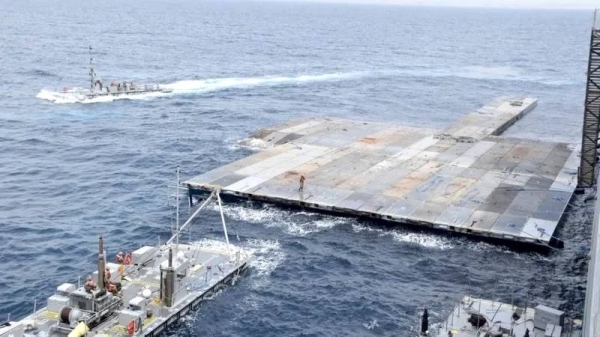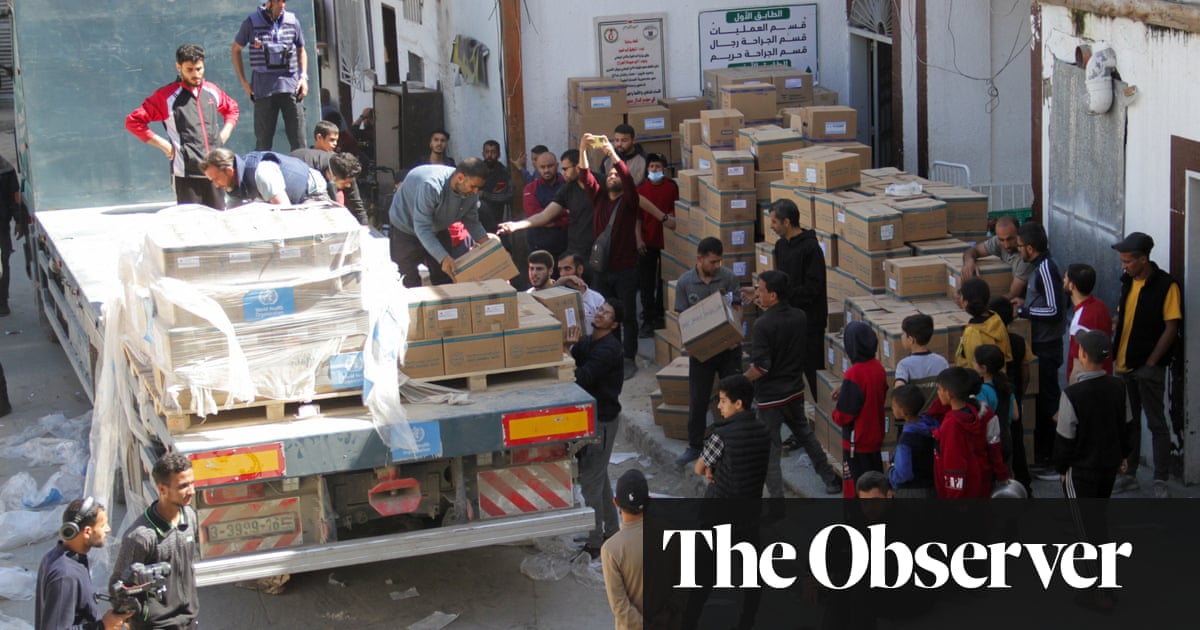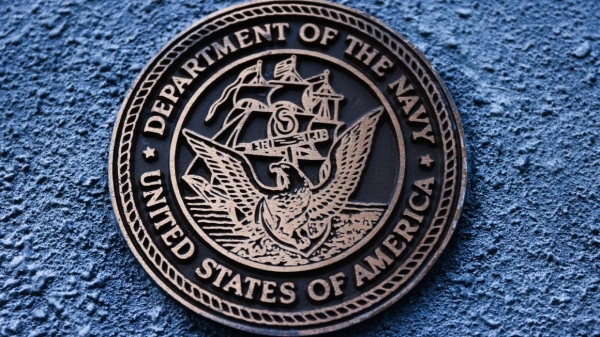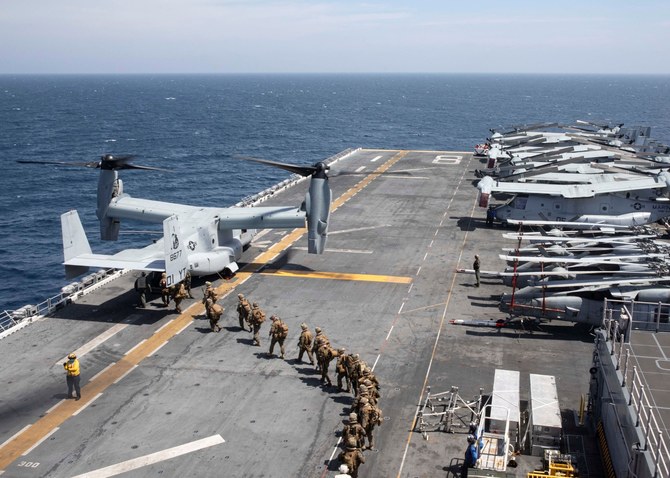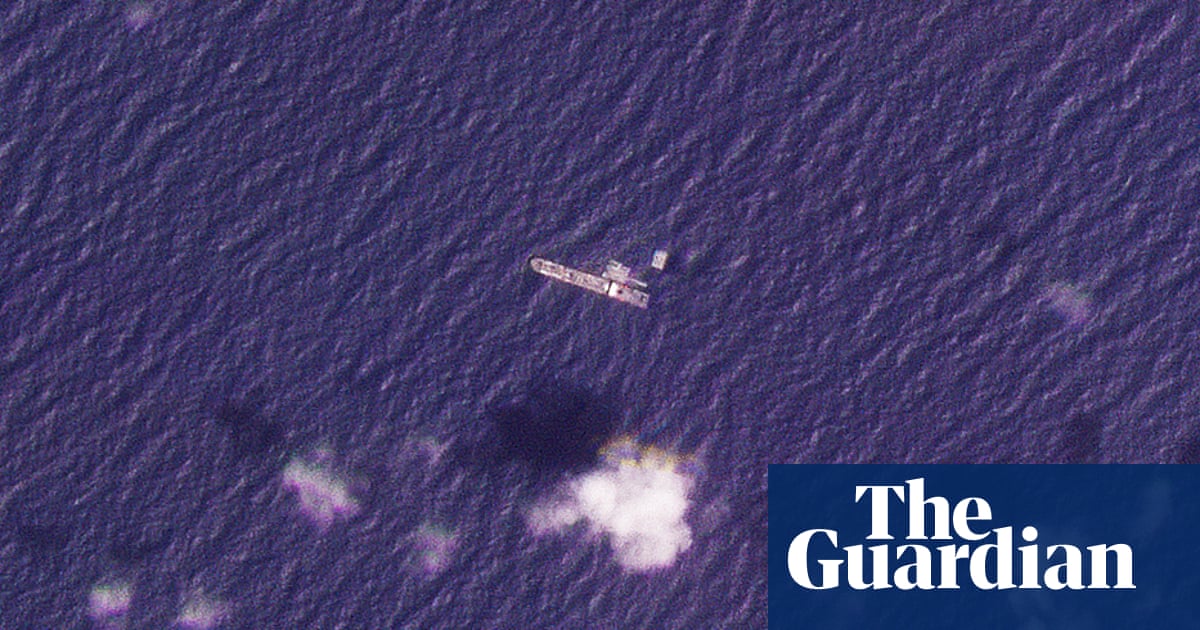
A US navy ship involved in an American-led effort to bring more aid into the besieged Gaza Strip is offshore from the territory and building out a floating platform for the operation, according to satellite photos analysed by the Associated Press.
The USNS Roy P Benavidez sits about 5 miles from the pier and base of operations for the project being built by the Israeli military.
A satellite image from Sunday by Planet Labs PBC showed pieces of the floating pier in the Mediterranean Sea alongside the vessel. The US military and Israeli authorities did not immediately respond to requests for comment about the Benavidez’s position.
Under the plan by the US military, aid will be loaded on to commercial ships in Cyprus to sail to the floating platform now under construction off Gaza. Pallets will be loaded on to trucks, which will be loaded on to smaller ships that travel to a metal, floating two-lane causeway. The 550-metre (1,800ft) causeway will lead to shore.
The new port sits just south-west of Gaza City, north of a road bisecting Gaza that the Israeli military built during the current fighting against Hamas. The area was the territory’s most populous region before the Israeli ground offensive rolled through and pushed more than a million people south toward the city of Rafah on the Egyptian border.
Israeli military positions now sit on either side of the pier, which initially had been built – as part of an effort led by World Central Kitchen – out of the rubble of buildings levelled by Israel. That effort halted after an Israeli airstrike killed seven WCK aid workers on 1 April as they travelled in clearly marked vehicles on a delivery mission authorised by Israel.
WCK said on Sunday that it would resume work in Gaza. Its CEO, Erin Gore, said the Israeli Defense Forces (IDF) had apologised for the attack and promised a change in their rules of operation, but that little was assured.
“While we have no concrete assurances, we continue to seek answers and advocate for change with the goal of better protecting WCK and all NGO workers serving selflessly in the worst humanitarian conditions,” she said. “Our demand for an impartial and international investigation remains.”
Gore said her organisation was exploring routes to allow more aid into Gaza, including a maritime corridor. Using cargo ships to deliver aid has drawn criticism from relief groups including the UN, amid criticism it is a less efficient way to deliver vital goods than over land.
Data from the UN shows that about 250 aid trucks enter Gaza each day, about half of what aid groups say are needed, amid reports of imminent famine in parts of the territory.
As WCK resumed operations, a coalition of activists and relief groups said they had postponed a plan to sail three ships from Turkey to Gaza carrying ambulances, anaesthetics and other forms of relief.
The Freedom Flotilla Coalition, a group comprising hundreds of international activists spearheaded by the Turkish Humanitarian Relief Foundation (IHH), said the flag carrier Guinea-Bissau removed its flag from two of the ships. “Without a flag, we cannot sail. But this is not the end,” they said in a statement.
Organisers said the shipping registry of Guinea-Bissau, administered by an Athens-based corporation, G-B International, contacted them to demand further inspection of one of their ships, the Akdeniz, a large passenger ship moored in an Istanbul shipyard.
Before the inspection was completed, they said, G-B International told them it had withdrawn the flag from the Akdeniz and a cargo ship.
IHH has sent multiple cargo ships of aid to Al-Arish in Egypt, which then enters Gaza through the Rafah crossing with the consent of the Israeli authorities. However, in this instance activists onboard the flotilla said they would not cooperate with Israel in any way to deliver the aid onboard once they reached Gaza.
The organisers said G-B international demanded “a formal letter explicitly approving the transportation of humanitarian aid and a complete manifest of the cargo”.
Eirini Sampani, a legal officer with G-B international, said signing up to its register entailed a commitment not to “engage on a unilateral basis in war zones against internationally followed practices and UN resolutions, such as the Gaza area”.
Sampani and G-B international said they were “closely monitoring the situation and cooperating with relevant authorities to ensure that any potential commercial activity adheres to applicable laws and regulations”.
They declined to answer further questions about what had prompted the company to suddenly withdraw the flags, or what information was provided by IHH about the ship’s purpose or destination during registration.
The activists’ efforts to reach Gaza from Turkey marked a repeat of an attempt in 2010 in which the boats were boarded by Israeli commandos in international waters. Nine people were killed on one of the boats.
Activists and IHH said reports of imminent famine in Gaza and the rising loss of life made them decide to reprise the flotilla, even though the 2010 incident prompted a dramatic break in Turkish-Israeli relations that lasted for years. The Israeli prime minister, Benjamin Netanyahu, was pressed into apologising to the Turkish president, Recep Tayyip Erdoğan, for the incident by the then US president, Barack Obama.
Aid groups say maritime deliveries and airdrops are not enough to ward off famine. The relief organisation Oxfam said Israel should “lift its total blockade of Gaza” and stop arbitrary blocks that prevented relief from entering.
The White House national security spokesperson John Kirby told ABC News that a floating pier built by the US military would be operative in two or three weeks’ time.
He said that while it was designed to increase aid into Gaza, the maritime route remained a limited way to bring in relief. “Nothing can replace the ground routes and the trucks that are getting in,” he said.




